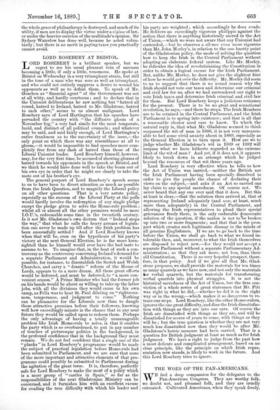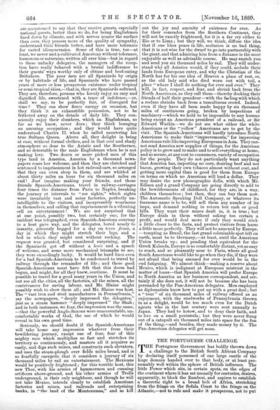THE WOES OF' TILE PAN-AMERICANS W E feel a deep compassion
for the delegates to the Pan-American Congress. They are worthy folk, we doubt not, and pleasant folk, and they are critelly entreated. Cultivated Americans, when they speak freely, are accustomed to say that they receive guests, especially national guests, better than we do, for being Englishmen fined down by climate, and with nerves nearer the surface than ours, they possess more of the quality of sympathy, understand their friends better, and have more tolerance for varied idiosyncrasies. Some of this is true, too—at least, we never met a cultivated American without tolerance, humorous or saturnine, written all over him—but in regard to these unlucky delegates, the managers of the recep- tion have really behaved with a brutal indifference to their guests' ways worthy only of obtuse and beef-eating Britishers. The poor men are all Spaniards by origin or by habitude of life, and Spaniards who have passed years of more or less prosperous existence under tropical or semi-tropical skies,—that is, they are Spaniards softened. They are, therefore, persons who keenly enjoy an easy and dignified life, sweetened with a trace of indolence,—or, shall we say, to be perfectly fair, of disregard for time ? They can show fierce energy on occasion, but they think it an exhaustible possession, not to be frittered away on the details of daily life. They con- sciously enjoy their slumbers, which an Englishman, so far as we know, never does ; they think lounging an amusing occupation ; and they would have quite understood Charles II. when he called sauntering his true Sultana Queen. Above all, they delight in being at ease, without formal clothes, and in that cool and shady atmosphere so dear to the Asiatic and the Southerner, and so detestable to the male Englishman when he is not making love. Two dozen or more picked men of this type land in America, America by a thousand news- papers roars her welcome, and then they are clutched and sentenced to imprisonment in hot railroad cars, so arranged that they can even sleep in them, and are whirled at about thirty miles an hour for six thousand miles on end ! Just imagine making your friends, and those Mends Spanish-Americans, travel in railway-carriages four times the distance from Paris to Naples, breaking the journey at intervals to "see sights," which sights were invariably vast and. noisy factories, perfectly un- intelligible to the visitors, and inexpressibly wearisome in themselves, and calling that imprisonment in a vibrating cell an entertainment ! We are not surprised that at one point, possibly two, but certainly one, for the incident was telegraphed, even Spanish-American courtesy to a host gave way, and the delegates, bored nearly to insanity, piteously begged for a day on terra firma, a day in which they might stretch their legs, and a bed in which they might rest without rocking. The request was granted, but considered surprising, and if the Spaniards got off without a levee and a speech of welcome, and some more mechanical triumphs to see, they were exceedingly lucky. It would be hard lines even for a bad Spanish-American to be condemned to travel by railway through the remainder of life ; and these good Spanish-Americans must have felt that this doom had begun, and might, for all they knew, continue. It must be possible to travel for a good many years in the Union, and not see all the cities, all the factories, all the mines, all the contrivances for saving labour, and Mr. Blaine might possibly wish to show them all ; and Mr. Blaine was host. The "vast iron and steel manufactures in Pennsylvania," say the newspapers, "deeply impressed the delegates," just as a steam hammer "deeply impressed" the Shah ; and in both instances, we fear, the impression was the same, —that the powerful Anglo-Saxons were unaccountable, un- comfortable works of God, the use of which he would reveal in his own good time.
Seriously, we should doubt if the Spanish-Americans -will take home any impression whatever from their bewildering journey, except one of fear, fear of this mighty race which multiplies so fast and stretches its territory so continuously, and. masters all it acquires so easily, and digs such mines, and constructs such elevators, and uses the steam-plough over fields miles broad, and is so fearfully energetic that it considers a journey of six thousand miles by rail an entertainment The Mexicans would be positively frightened ; for this terrible host, this new Thor, with his armies of hammermen and cunning artificers above-ground, and his 'other armies of Trolls underground, is their only neighbour, and though he will not take Mexico, intends clearly to establish American factories and, mines, and railroads and enterprising banks, in "the land of the Montezumas," and so kill out the joy and amenity of existence for ever. As for their comrades from the Southern Continent, they will not be exactly frightened, for it is a far cry either to Rio or to Lima ; but they will, we think, diffuse the idea that if one likes peace in life, seclusion is no bad thing, that it is not wise for the dwarf to go into partnership with the giant, and that admiring him from a distance is the most enjoyable as well as advisable course. He may snatch you and send you six thousand miles by rail. They will under- stand why all Asiatics would, if they could, seclude their lands from European entry, and why the Christian of the North has for his one idea of Heaven a place of rest, or, as the old lady said who died worn out with toil, a place "where I shall do nothing for ever and ever." They will, in fact, respect, and fear, and shrink back from the North Americans, as they call them—thereby docking their friends of half their grandeur—with the feeling with which a recluse shrinks back from a tumultuous crowd. Indeed, even if they have all been made happy by six thousand miles of continuous going, broken by inspections of machinery—which we hold to be impossible to any human being except an American president of a railroad, or Sir Edward Watkin—we do not see what either the white Americans or the " yellow " Americans are to get by the visit. The Spanish-Americans will hardly introduce North Americans to make their "improvements," for improving Americans rule like improving Europeans in Asia. They can- not send America new supplies of things, for the American policy is to grow and to make and to sell everything at home, and so secure, at any cost to consumers, variety of occupation for the people. They do not .particularly want anything that America has, importing no corn, desiring beef and not bacon, growing their own tobacco almost without cost, and getting more capital than is good for them from Europe on terms on which no American will lend a dollar. They may desire the new phonographic dolls, with which Mr. Edison and. a grand Company are going directly to add to the bewilderments of childhood, for they are, in a way, children themselves ; but then, they can buy them now. The Automatic Speaking Doll Company, or whatever its fearsome name is to be, will sell them any number of its imps, and demand nothing in return but cash or good bills. They want their mines dealt in, it is true ; but Europe deals in them without asking too certain a profit, and would deal more if only they would stick a little closer to the facts, and protect visitors from harm a little more perfectly. They will not be annexed by Europe, —tempting as Brazil, the last grand colonisable spot left on earth, must be to Germany,—at least, until the American Union breaks up ; and pending that equivalent for the Greek Kalends, Europe is so comfortably distant, yet so easy to reach, and so pleasantly near to Paris, where all good South Americans would like to go when they die, if they were not afraid that being amused for ever would be in the end fatiguing. We almost think—making a reserve about Mexico, which is indignant at European mistrust in the matter of loans—that Spanish America will prefer Europe to North America as her business correspondent, and cer- tainly if she does not, it will not be because she has been persuaded by the Pan-American delegates. Men employed as diplomatists know how to put up with a great deal ; but a " tour " of six thousand miles of railway offered as an enjoyment, with the steelworks of Pennsylvania thrown in as a delight, would be too much even for the Dutch agents who in the last century were sent annually to Japan. They had to kotow, and to deny their faith, and to live on a small peninbula ; but they were never flung out of a catapult six thousand miles into space for the fun of the thing,—and besides, they made money by it. The Pan-American delegates will get none.



















































 Previous page
Previous page